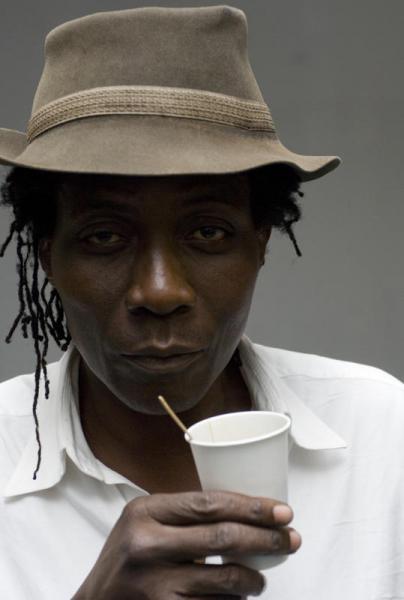Lionel Manga
After graduating with a Science Baccalaureate in 1973, Lionel Manga arrived in France after the crisis caused both by the first oil crash and by the Chilean political turmoil. He embarked on an Economic Analysis and Business Management course at the UER (Paris 1 – Tolbiac). Passionate about rock and jazz-rock, with Fela Ramsone Kuti and Manu Dibango as a backdrop, he joined far-left movements, delved into the writings of major philosophers, such as Michel Foucault, Gilles Deleuze, Kostas Axelos, and Herbert Marcuse, who challenged the mechanisms underlying capitalist domination and alienation. He self-ejected from university in 1976. Thanks to a cunning ploy by Reverend Engelberg Mveng and his parents, he was made to return to Cameroun on February 18th, 1978. Instead of being given a chance to explain himself, his passport was quite simply confiscated.
This free spirit therefore delved deep into this Cameroon led by Ahmadou Ahidjo and his single-party system. Sleepless nights became his refuge. Books and the high-tech magazine Science became his bunker in a context of widespread mind-numbness. He was part of the first output by Les Têtes brûlées in 1988, having introduced the late Zanzibar to the music of Jimi Hendrix. From 1992 to 1996, he presented an extremely popular morning program three times a week at 7:45 on environmental challenges entitled Klorofil, dubbing himself The Little Green Man. The morning and suave voice on FM 94 took on a face during the African Logik season. He was the first to organize rap/hip-hop concerts in this mythic venue of Yaounde as well as a memorable Bob Marley tribute in 1997, which was broadcast live.
In 2004, he settled in Douala, his childhood and teenage town. Just in time to write the text-manifesto of the Ars & Urbis program initiated by the doual’art contemporary arts center. At the first S.U.D edition of 2007, he led the Blend-Skin project with an artist called Phillipe Mouillon, based in Grenoble. Published in 2008, L’ivresse du papillon, was the only book to-date dealing with the visual arts scene in Cameroun. He was invited to attend the Black Arts Festival of 2010 in Dakar by the architect Jean-Charles Tall, whom he had met at the first Ars & Urbis colloquium. The unclassifiable Altriciel later recounted the event. When staying at La Criée contemporary arts center in Rennes in January 2009, his assurance greatly impressed the then Director of the center, Larys Frogier. In February 2011, he stayed in Karachi alongside Dominique Malaquais, for a residency with the visual artist Amin Gulgee, under SPARK’s sponsorship. His article on Cameroonian bass players was published in Chimurenga and earned him a collaboration credit on I’m not your week-end special dedicated to Brenda Fassie. For a long time, he worked on a weekly chronicle Le Messager, before the sudden disparition of Pius Njawé.
